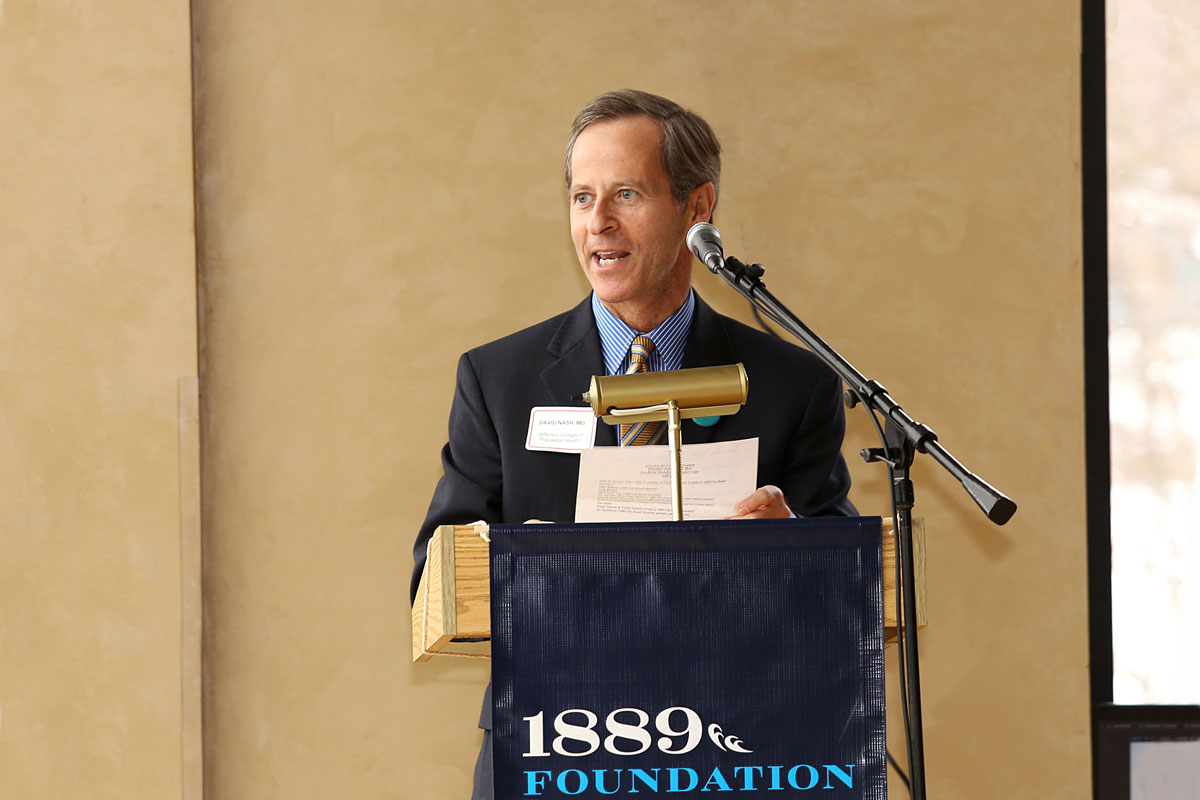(JOHNSTOWN, Pa.) The 1889 Foundation today announced a $7.5 million, five-year gift establishing the 1889 Foundation-Jefferson Center for Population Health in Johnstown. The Center, which is a partnership between the 1889 Foundation and the Jefferson College of Population Health of Thomas Jefferson University in Philadelphia, will identify, quantify and develop strategies for improving the health of the citizens of Cambria and Somerset Counties. This partnership will bring an academic approach and rigor to the research that will inform the decisions and interventions made as a result of the process.
In its most fundamental sense, population health is a systematic approach to health care that aims to prevent and cure disease by keeping people healthy. Population health works to address the social and environmental factors outside the care delivery system that affect health and well-being.
“The 1889 Foundation’s mission is to support innovative programs and initiatives to transform the overall health and wellness of our community. By taking a population health approach, we have an enormous opportunity to make giant strides toward fulfilling our mission,” said James Hargreaves, board chairman of the 1889 Foundation.
Specifically, the goals of the 1889 Foundation-Jefferson Center for Population Health are:
- Connect prevention, wellness and behavioral healthcare delivery in Cambria and Somerset Counties
- Identify socio-economic and cultural factors that influence the health of the population
- Develop policies that address the impact of these factors
- Use data analysis, or “big data,” to design social and community interventions
- Recommend innovative solutions to complex public health issues
The 1889 Foundation-Jefferson Center for Population Health will be located in Johnstown. The director of the Center will also hold the Victor Heiser, MD Endowed Professorship at the Jefferson College of Population Health, the nation’s first college devoted to this area of study. Dr. Victor Heiser, orphaned in the 1889 Johnstown flood, left town to attend and graduate from what was then known as Jefferson Medical College. He went on to become a key figure in public health, and his work is credited with saving as many as two million people across the globe.
“Dr. Heiser had a great impact on this community, and it is uniquely fitting to name the professorship in his honor,” said David B. Nash, MD, MBA, the founding dean of Jefferson College of Population Health.
The new Center has already begun forming connections with healthcare and community organizations in the region on this effort.
“According to research conducted by the Robert Wood Johnson Foundation, Somerset and Cambria Counties are ranked the 46th and 60th healthiest, respectively, of Pennsylvania’s 67 counties,” Dr. Nash said. “That means there is much room for improvement, and we are excited to begin.”
Population health is a relatively new concept, and has been studied mostly in large urban areas. It is expected that the 1889 Foundation-Jefferson Center for Population Health will become a national model for how population health interventions can work in smaller communities.
“Ultimately, our goal is to create a measurable, multi-generational impact on the quality of life here,” said Susan Mann, president of the 1889 Foundation. “That will, in turn, have positive effects on the business climate and the vibrancy of our entire community, while lowering the cost of healthcare.”
Timeline
The $7.5 million gift will establish the Center with an initial timeline of five years. Key steps include:
A leading population health expert will be recruited to serve as the inaugural director for the new Center. The director, who will be located in Johnstown, will also hold the Victor Heiser, MD Endowed Professorship at Jefferson College.
The Center’s new director will hire professional staff to support the work of the Center.
Together, the team will conduct research, develop strategies and recommendations for interventions to improve population health, and will study the impact of those interventions. At the end of the five years, the Jefferson College of Population Health may seek renewed funding from the 1889 Foundation to continue the partnership, as improving population health is a long-term proposition.
Today’s announcement follows the 1889 Foundation’s previous gift, a $500,000 matching grant to the United Way of the Laurel Highlands to increase the reach and impact of the United Way’s Community Impact grants. That grant provided a dollar-for-dollar match of up to $500,000 for the United Way’s annual fundraising campaign.
Download this press release
Download an infographic about population health




